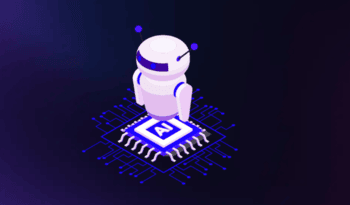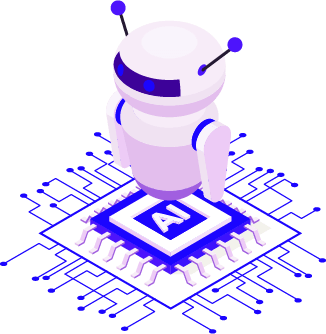
Beyond Chatbots – Understanding the Autonomous Power of AI Agents

By Teqfocus COE
25th June, 2025
If chatbots are scripts, AI agents are software with intent.
In today’s enterprise landscape, AI-powered automation is no longer a distant promise. Yet too often, it gets narrowly defined by chatbots that handle basic FAQs or simple ticket escalations. This oversimplification misses the real breakthrough: autonomous AI agents that transform how intelligent work happens at scale.
This chapter of the Teqfocus AI Transformation Series delves deep into AI agents – what they are (and aren’t), how they create business value, and how organizations can operationalize them well beyond rigid, scripted workflows.
What’s the Difference Between a Chatbot and an AI Agent?
|
Feature |
Chatbot |
AI Agent |
|
Intelligence |
Predefined responses or rule-based |
AI-powered reasoning and language understanding |
|
Workflow execution |
Single-step tasks or FAQ routing |
Multi-step actions across systems |
|
Context awareness |
Stateless, limited memory |
Contextual, stateful, capable of memory persistence |
|
Use case scope |
Reactive support |
End-to-end workflow automation |
|
Adaptability |
Static flows |
Dynamic, can improve via feedback |
McKinsey reports that companies adopting AI for end-to-end automation can reduce operational costs by up to 30% while improving accuracy and customer satisfactions. This level of efficiency is not achievable with static chatbots alone.Key Capabilities of AI Agents
AI agents are distinguished by a unique combination of advanced capabilities;
- Natural language understanding: Interpreting unstructured text beyond simple keyword matching.
- Goal-oriented behavior (task planning): Sequencing actions to achieve complex objectives.
- Tool use and action execution: Interfacing with APIs, databases, and enterprise systems.
- Multi-turn dialogue and memory recall: Maintaining context across conversations.
- Autonomous orchestration of systems and APIs: Coordinating multi-system workflows.
- Learning loop for self-improvement: Iteratively enhancing performance based on feedback and outcomes.
Gartner forecasts that by 2026, 30% of enterprises will have deployed AI agents in mission-critical functions, reshaping the way businesses operate. These agents thrive where judgement, sequencing, and contextual nuance are essential.
Real-World Use Cases
1. Population Health Assistant
An AI agent reads patient summaries, extracts medication history, analyzes recent claims, and drafts a care plan – all before presenting it to a nurse for review. In healthcare, precision and personalization are paramount. According to Harvard Business Review, AI-enabled care coordination can reduce hospital readmissions by 15-20%.
2. Sales Development Rep (SDR) Agent
An autonomous SDR agent analyzes lead data, drafts personalized outreach, sends emails, tracks replies, updates Salesforce records, and books meetings. Salesforce’s Agentforce platform exemplifies this, demonstrating how multi-step prospecting can be automated without sacrificing personalizations.
3. Service Agent
This agent interacts with customers, queries backend systems, creates or updates cases, and follows up on SLA-driven workflows – minimizing manual intervention. Forrester notes that companies leveraging AI for service orchestration can improve resolution times by 25% while reducing support costs.s
These examples are not theoretical; they are already being implemented on platforms like Salesforce Agentforce, powered by Agent Builder.
How This Evolves the AI Stack
Building enterprise-grade AI agents requires a robust foundation;
- Resolve data silos
- Establish real-time, governed integration
- Leverage custom models via BYOM (Bring Your Own Model)
- Enable retrieval-augmented reasoning (RAR)
- Adopt a data-first operational model
- Use AI for task-level summarization
- Apply AI personalization and proactivity at scale
AI agents sit atop this stack – they are the orchestration layer that operationalizes intelligence across complex systems.
Agentforce: What the Platform Enables
Salesforce’s Agentforce platform, leveraging Agent Builder, offers a comprehensive toolset for enterprise adoption;
- Low-code/no-code agent creation
- Prebuilt templates for common functions (e.g., Service, SDR, Sales Coach)
- Multi-topic handling (7–10 topics per agent recommended for optimal accuracy)
- Embedded testing center to validate reasoning logic
- Skills framework to dynamically add tools, actions, and knowledge
- Governance tools to track performance, hallucination rates, and model drift
As highlighted by AWS, low-code AI agent builders dramatically reduce deployment time while allowing domain experts to contribute directlys.
The Agent Lifecycle: Build, Test, Iterate
|
Stage |
What Happens |
|
Design |
Define agent purpose, prompts, and topic scope |
|
Build |
Use Agent Builder to assemble logic and skills |
|
Test |
Simulate conversations and audit reasoning chains |
|
Deploy |
Connect to live channels (chat, CRM, mobile, etc.) |
|
Monitor |
Track usage, accuracy, and interaction quality |
|
Improve |
Refine prompts, close data gaps, and add new capabilities |
Success demands treating agents as products, not projects. This product mindset allows for rapid iteration, continuous learning, and scalable growth.
Guardrails: Making AI Agents Safe and Useful
AI agents must operate under clear governance to ensure;
- Data grounding: Reliable, updated enterprise data sources.
- Human escalation: Ability to hand over complex cases.
- Transparent reasoning: Explainable AI with auditable steps.
- Compliance alignment: Regulatory adherence across industries.
- Trust and voice: Consistent with enterprise tone and brand.
Failure to maintain these standards risks not just operational inefficiency but significant trust erosion. A Forrester report warns that 70% of enterprises rank AI governance as a top barrier to scaled AI adoption
Final Word: From Tasks to Intelligence at Scale
AI agents represent the next evolution of intelligent work. They don’t simply respond; they decide, act, learn, and drive outcomes.
If your organization aspires to go beyond basic automation – towards autonomous digital workers that operate across systems with real business impact.
Ready to operationalize production-grade AI agents?
Let’s talk. Schedule a consultation on AI readiness and integration strategy.
